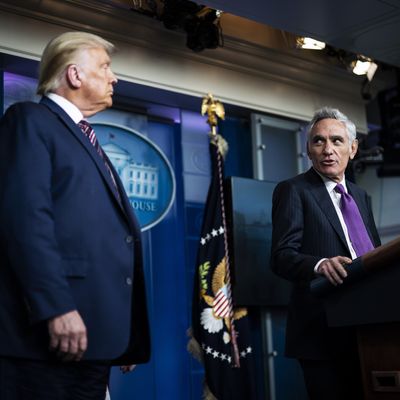
As COVID-19 swept through Italy and other parts of Europe in February and March, most nearby countries instituted strict, or semi-strict, lockdowns. Sweden went a different way. Instead, it embarked upon a strategy of “herd immunity,” hoping that enough healthy people would contract and recover from the virus for life to resume pretty much as normal.
Many experts — and Sweden’s neighbors — judged this experiment a failure. Sweden’s death rate dwarfs that of its neighbors, and its laissez-faire strategy did little to mitigate the economic damage of the virus, either.
Naturally, this is the model President Trump is now interested in replicating.
The president’s new, trusted adviser on the pandemic is Scott Atlas, a senior fellow at Stanford’s conservative Hoover Institution who endorses a Sweden-style approach for America that would protect specific vulnerable populations, like those in nursing homes, while largely allowing the coronavirus to spread unchecked through other sectors of society. And his philosophy may at least partially explain several shifts in federal policy over the last few weeks.
The Washington Post reports that Atlas, who has no background in epidemiology, impressed Trump on — where else — Fox News, where he has offered an alternative view to expert consensus on the virus and pleased conservatives who want an end to restrictions on public life that they consider overly strict.
Atlas reportedly calls himself the “anti-Fauci,” positioning himself in opposition to Anthony Fauci, who has become a villain in conservative media and who has been all but invisible in White House messaging in recent weeks. And indeed, Fauci, plus a raft of other experts, maintains that the approach Atlas advocates is deeply misguided.
The central problem is that even as the virus has run rampant across America — the country’s mortality rate is very near Sweden’s as is — nowhere near enough people in the United States have contracted the coronavirus to hit that threshold. The country has now surpassed 6 million cases, but the World Health Organization’s chief scientist says that 65 percent of the population would need to contract the virus to reach herd immunity. That would mean tens of millions of new cases and hundreds of thousands, if not millions, of deaths.
In an op-ed in The Wall Street Journal, former FDA commissioner Scott Gottlieb, a leading public voice on the pandemic, lays out of some of the other major concerns:
While age appears to be the strongest predictor of death and severe disease, other risks like diabetes and obesity correlate with bad outcomes. About 10% of Americans have diabetes, and 40% are considered obese. Young people can fall seriously ill. About 40% of hospitalizations in Sunbelt states in the last week of June were in people ages 18 to 49. Then there are those who survive but don’t fully recover. There’s growing evidence that the virus can damage the heart and cause dangerous autoimmune and inflammatory conditions, including in children.
Covid spreads too easily to think it can be confined to the young. The summer epidemics in Sunbelt states initially affected mainly a younger cohort and then seeped into an older population. A wedding in Maine caused an outbreak that spread to a rehabilitation center and a jail. It is neither possible nor desirable to lock away the elderly and people with underlying health conditions.
But despite the obvious flaws in Atlas’s thinking, the federal government is taking actions that would seem to endorse it, as the Post reports:
The Department of Health and Human Services, for instance, invoked the Defense Production Act earlier this month to expedite the shipment of tests to nursing homes — but the administration has not significantly ramped up spending on testing elsewhere, despite persistent shortages. Trump and top White House aides, including Atlas, have also repeatedly pushed to reopen schools and lift lockdown orders, despite outbreaks in several schools that attempted to resume in-person classes.
The Centers for Disease Control and Prevention also updated its testing guidance last week to say that those who are asymptomatic do not necessarily have to be tested. That prompted an outcry from medical groups, infectious-disease experts and local health officials, who said the change meant that asymptomatic people who had contact with an infected person would not be tested.
Given the mistrust among many governors engendered by the Trump administration’s fumbling response to the pandemic, plus the fragmented response that was perhaps an inevitable by-product of American federalism, it is unlikely that Atlas, or Trump, will be able to direct most of the country’s health-care infrastructure toward the “herd mentality” model. But the president’s embrace of the idea is yet another sign that — at least until January — a rational federal approach to fighting a virus that has killed more than 180,000 Americans will have to wait.






























